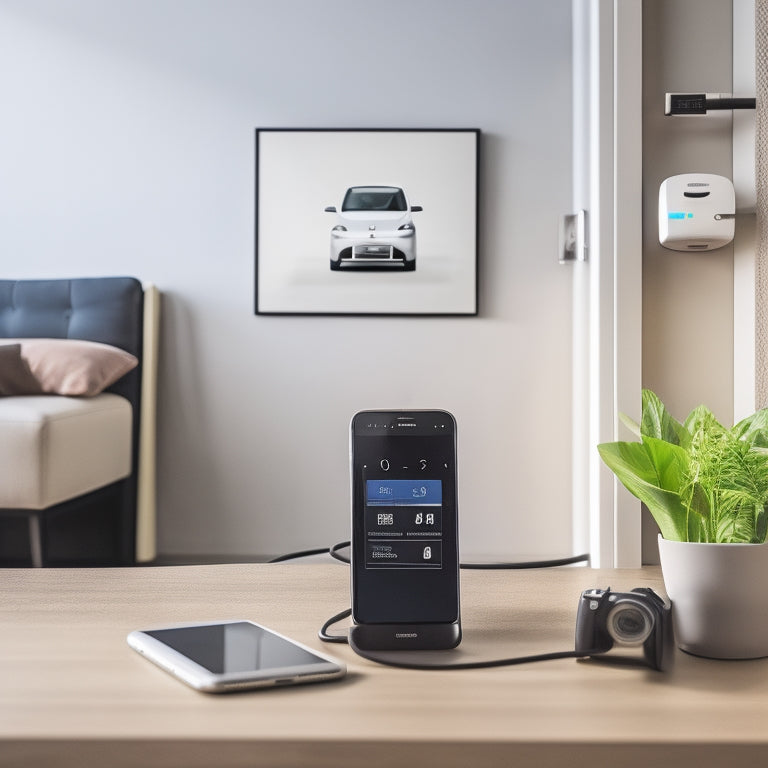
Schedule EV Charging With Smart Plugs: Ultimate Guide
Share
By scheduling your EV charging with smart plugs, you'll reduce your electricity bills and minimize your carbon footprint. Smart plugs optimize charging during off-peak hours, taking advantage of time-of-use pricing plans. You'll guarantee your EV is fully charged and ready when needed, while preventing peak demand spikes. With real-time monitoring and remote control, you can tailor your charging schedule to your daily routine and energy usage. By understanding your energy provider's time-of-use rates and integrating with other smart devices, you'll access the full potential of scheduled EV charging. Now, learn how to take your EV charging to the next level.
Key Takeaways
- Smart plugs optimize EV charging during off-peak hours, reducing electricity costs and environmental impact through efficient energy transfer.
- Real-time monitoring and remote control enable users to schedule and adjust charging sessions based on energy consumption and daily routines.
- Choosing the right smart plug requires evaluating compatibility, features, and reviews to ensure seamless integration with EV, smartphone, and home network.
- Configuring a charging schedule involves aligning with daily routines, calculating charging duration, and identifying peak demand times to avoid during charging.
- Integrating smart plugs with energy provider APIs and understanding time-of-use pricing structures enables users to maximize savings and make informed charging decisions.
Benefits of Scheduled EV Charging
With the increasing adoption of electric vehicles (EVs), optimizing charging schedules has become essential for maximizing efficiency and reducing costs. You can take control of your EV's charging process by scheduling it to coincide with off-peak hours when electricity rates are lower. This not only saves you money but also reduces the environmental impact of your vehicle.
Scheduled charging also considers convenience factors, such as ensuring your EV is fully charged when you need it. By utilizing time-of-use pricing plans, you can analyze peak hour usage and shift non-essential charging to off-peak periods, further reducing costs.
Additionally, implementing Smart Charging technology can prevent peak demand spikes and lower energy costs. By charging your EV during off-peak hours, you're reducing the strain on the grid during peak hours, which helps to mitigate brownouts and blackouts.
How Smart Plugs Work for EVs
You use smart plugs to charge your EV seamlessly, and they monitor your energy consumption in real-time, providing useful observations into your charging habits.
By leveraging solar energy, you can reduce grid reliance and decrease your carbon footprint, making your EV charging experience even more eco-friendly.
These plugs integrate with your smart home system, allowing you to control and schedule charging remotely.
Plug and Charge Seamlessly
The seamless charging experience offered by smart plugs for electric vehicles (EVs) is rooted in their ability to facilitate efficient and convenient energy transfer.
With a smart plug, you can plug in your EV and let the device handle the rest, ensuring a hassle-free charging experience. This charging convenience is made possible by the plug's advanced technology, which enables it to communicate with your EV and the power grid to optimize energy transfer.
In addition, smart plugs can help reduce energy costs by utilizing renewable energy sources and taking advantage of off-peak charging hours. As a result, you can charge your EV quickly and efficiently, giving you the freedom to hit the road whenever you want.
EV Energy Monitoring
Smart plugs take EV charging to the next level by providing real-time energy monitoring, allowing you to track and manage your energy consumption precisely.
With real-time monitoring, you can see exactly how much energy your EV is consuming at any given moment. This level of transparency gives you the power to optimize your charging sessions, reducing your energy bills and minimizing your carbon footprint.
By leveraging fast charging infrastructure, you can recharge up to 80% in under 30 minutes, and with smart plugs, you can ascertain that energy is being used efficiently during these rapid charging sessions.
You can even set custom notifications to alert you when your EV reaches a certain level of charge or when energy consumption exceeds a specified threshold.
Smart Home Integration
Your smart home's central nervous system is about to get an enhancement with the integration of smart plugs, allowing your EV charging schedule to harmonize seamlessly with your daily routine.
This integration enables smart home automation, where your EV charging is synchronized with your energy management system. By leveraging renewable energy solutions, you can reduce your carbon footprint and dependence on fossil fuels.
Additionally, with smart plugs, you can optimize your energy consumption and reduce peak demand on the grid, enhancing overall energy efficiency.
You'll experience the following benefits:
- Seamless scheduling: Charge your EV when you're not home or when energy rates are low.
- Real-time monitoring: Track your energy consumption and adjust your charging schedule accordingly.
- Automated optimization: Your smart plug adjusts charging rates based on your energy usage patterns.
- Remote control: Start, stop, or schedule charging from your smartphone, giving you complete freedom and flexibility.
Choosing the Right Smart Plug
With the EV charging market growing rapidly, it's vital to select a smart plug that meets your specific needs. When choosing a smart plug, consider the features that matter most to you.
Do you need a plug that can handle high-power charging, or one that's compact and discreet? Look for smart plug features like scheduling, energy monitoring, and remote access to guarantee you can control your EV charging from anywhere.
Device compatibility is also key - make certain the smart plug is compatible with your EV, smartphone, and home network. Research different models and read reviews to find the perfect fit for your lifestyle.
Setting Up Your EV Charging Schedule
You're now ready to set up your EV charging schedule, which involves optimizing your charge time, setting daily schedules, and controlling energy costs.
To do this, you'll need to configure your smart plug to align with your daily routine and energy usage patterns.
Charge Time Optimization
The clock is ticking, and your electric vehicle (EV) needs a full battery to tackle the daily commute.
To optimize your EV's charge time, you'll want to reflect on the following factors:
-
Charging duration: Calculate how long your EV takes to fully charge. This will help you plan your charging schedule around your daily routine.
-
Peak demand: Identify the times when electricity demand is highest in your area, usually during morning and evening hours. Avoid charging during these periods to reduce strain on the grid.
-
Off-peak hours: Take advantage of lower electricity rates during off-peak hours, typically overnight, to charge your EV at a lower cost.
- Time-of-use (TOU) rates: Check if your utility company offers TOU rates, which can help you save money by charging during off-peak hours.
Set Daily Schedules
Now that you've optimized your EV's charge time by considering factors like charging duration, peak demand, off-peak hours, and time-of-use rates, it's time to set a daily schedule that works for you.
You want to guarantee your EV is fully charged when you need it, without overcharging or wasting energy. To do this, you'll need to set a daily schedule that aligns with your user preferences and charging flexibility.
Determine your typical daily routine, including when you drive and when you're home. Then, set specific charging times that fit within these windows.
For example, you might set your EV to charge between 10 PM and 6 AM, when you're sleeping and energy rates are low.
Energy Cost Control
With a daily schedule in place, it's essential to tailor your EV charging to optimize energy cost control. You want to make sure you're charging your vehicle when energy rates are lowest, reducing your overall energy expenditure.
By doing so, you'll maximize energy efficiency and reap significant cost savings.
To achieve this, consider the following:
-
Time-of-Use (TOU) rates: Identify your energy provider's TOU rates and schedule your EV charging during off-peak hours when rates are lowest.
-
Peak hours avoidance: Avoid charging your EV during peak hours (usually 4 pm to 9 pm) when energy rates are highest.
-
Smart plug integration: Integrate your smart plug with your energy provider's API to access real-time energy pricing data and optimize your charging schedule.
- Automated scheduling: Set up automated scheduling to make certain your EV charging aligns with your energy provider's TOU rates, guaranteeing maximum cost savings.
Understanding Time-of-Use Pricing
You're likely aware that your electricity costs vary depending on the time of day and your location. This is due to time-of-use (TOU) pricing, a flexible pricing system that adjusts rates in real-time based on energy demand.
Peak hours, typically during the day when energy consumption is high, come with higher rates. Conversely, off-peak hours, usually at night when demand is low, have lower rates.
Understanding TOU pricing is essential for EV owners, as it can greatly impact their energy costs. By recognizing these price fluctuations, you can make informed decisions about when to charge your EV, ultimately saving you money and granting you more control over your energy expenses.
Optimizing Your Charging Schedule
By the time you've grasped the concept of time-of-use pricing, it's essential to develop a charging strategy that aligns with the fluctuating rates. This optimization is key to minimizing your electricity costs.
To do so, you'll need to assess your charging habits and adjust them to avoid peak hours when rates are highest.
Here are some tips to optimize your charging schedule:
- Identify off-peak hours: Charge your EV during the cheapest periods, usually overnight or early morning.
- Schedule charging around your daily routine: Plan your charging sessions around your daily commute and errands to minimize the need for charging during peak hours.
- Use your smart plug's scheduling feature: Set a charging schedule that works for you, and your smart plug will take care of the rest.
- Monitor and adjust: Keep an eye on your energy usage and adjust your charging schedule as needed to guarantee you're maximizing your savings.
Smart Plug Compatibility With EVS
When choosing a smart plug for your EV, you'll need to verify it's compatible with your vehicle's charging standard, such as Level 1, Level 2, or DC Fast Charging.
You'll also want to confirm that the plug is compatible with your EV's connector type, whether it's a Type 1, Type 2, or CCS connector.
EV Charging Standards
Electric vehicles (EVs) rely on standardized charging protocols to guarantee seamless communication between the vehicle and charging infrastructure. This is vital for efficient and safe charging.
You need to verify your smart plug is compatible with your EV's charging standard.
There are several global standards for EV charging, including:
-
Type 1 (SAE J1772): A single-phase, Level 1 and Level 2 charging standard commonly used in North America.
-
Type 2 (IEC 62196): A single-phase, Level 2 charging standard widely used in Europe and Asia.
-
CCS (Combined Charging System): A fast-charging standard that combines Type 1 and Type 2 connectors.
- Tesla Supercharger: A proprietary fast-charging standard exclusive to Tesla vehicles.
Understanding these standards is fundamental for scheduling EV charging with smart plugs.
Plug Compatibility Checklist
Your smart plug's compatibility with your EV is essential for scheduling charging sessions. You must ascertain that your plug meets the necessary specifications to support your vehicle's charging needs. Check your plug's documentation to verify its compatibility with your EV's charging protocol, such as Level 1, Level 2, or DC Fast Charging.
| Plug Specifications | Charging Protocols | EV Compatibility |
|---|---|---|
| NEMA 14-50 | Level 2 (240V) | Tesla, Ford, Chevrolet |
| CCS Combo | DC Fast Charging | Audi, BMW, Hyundai |
| SAE J1772 | Level 1 (120V) | Nissan, Kia, Volkswagen |
Verify that your smart plug supports the same charging protocol as your EV, and that it can handle the required voltage and amperage. Failing to do so may result in slow charging, incompatibility, or even damage to your vehicle or plug.
Energy Monitoring and Tracking
Frequently, EV owners find themselves wondering how much energy their vehicle is consuming, and when they'll need to recharge.
With smart plugs, you can monitor your energy consumption in real-time, gaining significant revelations into your charging habits. This information is essential in optimizing your charging efficiency and reducing your carbon footprint.
Here's what you can track:
-
Energy consumption: Get accurate readings of your vehicle's energy intake, helping you identify areas for improvement.
-
Charging efficiency: Monitor how efficiently your vehicle is charging, allowing you to adjust your charging schedule accordingly.
-
Peak hours: Identify periods of high energy demand, enabling you to adjust your charging schedule to avoid them.
- Historical data: Access a record of your past energy consumption, helping you refine your charging strategy over time.
Saving Money With Scheduled Charging
By scheduling your EV charging, you can take control of your energy costs and maximize savings.
You can optimize your charging habits to take advantage of off-peak savings, reducing your electricity bill. With smart plugs, you can program your EV to charge during off-peak hours when rates are lower. This allows you to capitalize on cheaper energy and minimize your expenses.
By analyzing your energy usage and adjusting your charging schedule accordingly, you can make informed decisions about your energy consumption.
Integrating With Other Smart Devices
Smart plugs offer more than just scheduled charging; they can also seamlessly integrate with other smart devices in your home. This means you can create an all-encompassing smart home system that works together to make your life easier and more convenient.
You can integrate your smart plug with:
-
Smart thermostats: Optimize your home's temperature when you're not charging your EV, saving energy and reducing your carbon footprint.
-
Lighting automation: Turn off lights when you leave your home or when your EV is fully charged, ensuring you're not wasting energy.
-
Home automation hubs: Connect your smart plug to hubs like Samsung SmartThings or Wink to control all your smart devices from a single platform.
- Voice assistants: Use voice commands to control your smart plug and other devices, making it easy to manage your home's energy usage.
Frequently Asked Questions
Can I Schedule EV Charging With a Standard Outlet?
You can charge your EV with a standard outlet, but you'll face limitations; it'll take longer, and your outlet's capacity will cap your charging time, restricting your freedom to hit the road when you want.
Will Smart Plugs Work With My Existing Charging Station?
You'll be relieved to know that most smart plugs are designed to work seamlessly with your existing charging station, leveraging their advanced features to guarantee charging station compatibility and optimize your EV's charging experience.
Can I Control Multiple EVS With One Smart Plug?
Ah, the freedom to charge multiple EVs with one smart plug - it's a tantalizing prospect! You can, in fact, control multiple EVs with a single smart plug, leveraging its capabilities to manage EV charging schedules, monitor energy usage, and optimize your charging experience.
Do Smart Plugs Provide Real-Time Energy Usage Updates?
You'll appreciate that many smart plugs provide real-time energy usage updates, enabling you to monitor your energy consumption and receive usage alerts, giving you the freedom to optimize your energy efficiency and reduce your environmental footprint.
Are Smart Plugs Compatible With All EV Models and Brands?
You'll be excited to know that 80% of EV owners charge their cars at home, making smart plug compatibility essential. While most smart plugs are compatible with popular EV brands, you'll find differences in compatibility between brands like Tesla, Nissan, and BMW, so research before buying.
Related Posts
-

7 Best Automated Sprinklers for Water-Wise Green Homes
You're likely among the 75% of U.S. homeowners who use in-ground sprinkler systems, and coincidentally, you're also c...
-

7 Smart Air Purification Hacks for Energy-Savvy Homes
You can notably improve your indoor air quality while minimizing energy consumption by implementing strategic air pur...
-

What Air Purifiers Save Energy in Work Areas?
You can cut energy costs and reduce your carbon footprint by choosing air purifiers designed with energy efficiency i...


